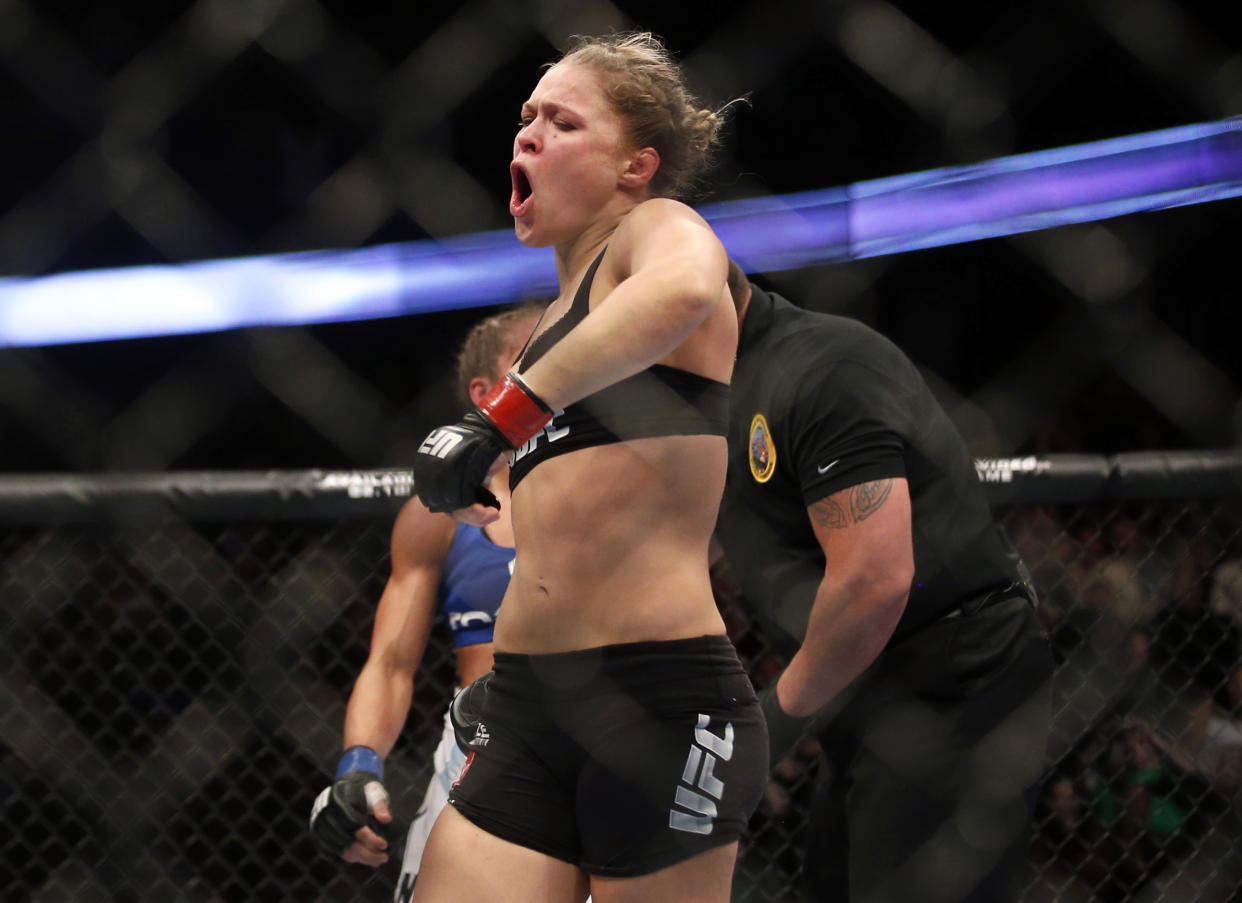No, Ronda Rousey isn't the greatest fighter of all time. But for women's MMA, she was the most important

In the distant past of a few months ago, back when the UFC was still scrambling around for a headliner worthy of next weekend’s UFC 300, the ever-helpful public started suggesting names plucked from MMA lore.
One of those names was Ronda Rousey, the promotion’s first female champ, who’d left the UFC after back-to-back losses and then made a new career for herself in the WWE. The suggestion alone had UFC president Dana White shaking his head.
“Ronda’s not coming back,” White said. There was a finality to it that let you know he wasn’t just guessing.
Based on Rousey’s comments in a podcast with YouTuber Valeria Lipovetsky released this week, it seems like White was right. To hear Rousey tell it, she didn’t exactly leave with the fondest feelings about MMA. After her loss to Amanda Nunes at UFC 207 — her second straight loss after starting her pro career 12-0 — she said she quit MMA “cold turkey” in part due to concerns about repeated head trauma, but also because she felt her contributions were going unappreciated.
“When I finally lost and I was just demonized by the whole world, it forced me to completely sever from that and find things that are validating in themselves and in my own world and the people I loved and respected around me,” Rousey said.
She added that she’d returned too soon from her first pro loss against Holly Holm (the two fights were slightly over one year apart), mostly because she felt she “owed it to the fans.” But her brain hadn’t fully recovered and she was “out on [her] feet” as soon as Nunes hit her, Rousey said. Not that anyone seemed to care as they set to work meme-ifying her worst moments from the lopsided loss.
This left Rousey feeling bitter and resentful toward MMA and its fans, she said, so she left the sport forever. It was about as sudden a rise and fall and exit as we’ve ever seen in fight sports.
In the span of just a few years, Rousey went from someone only judo enthusiasts had ever heard of to probably the most impactful female fighter in combat sports history. Then, with the first two losses of her career, it was all over. From start to finish it was just under six years.
What are we supposed to make of that?
Rousey has some ideas. In her telling, both her losses were some combination of bad luck and bad timing. Against Holm, she said, she had a “bad mouthpiece” and a bad weight cut. Against Nunes? She was still reeling from that Holm knockout that resulted from the bad mouthpiece/weight cut.
Zero legitimate losses, in other words. Which, ain’t that always just the way?
“Just from that one fight, everybody felt like, ‘Oh she’s a fraud,’” Rousey said. “And I know that I’m the greatest fighter that has ever lived. But when I got to the point where I just neurologically couldn’t take it anymore, suddenly everything I accomplished meant nothing.”
Two things can be true here. One is that, as someone who won an Olympic bronze medal in judo, followed by the first UFC women’s title, Rousey is entitled to feel like she is or at least was the greatest fighter in the world. Maybe she even needed to believe that in order to get to those levels in the first place, not to mention continue walking into a cage with the necessary confidence.
But the second thing is that, by any sober analysis of the facts, Rousey is not the greatest fighter of all time. To make such a claim is to put yourself up there with Muhammad Ali and Jon Jones and “Sugar” Ray Robinson and Demetrious Johnson and a whole bunch of others, which is a hard claim to make with a 12-2 professional record.
Even if we interpret it as Rousey saying she’s the greatest fighter in the history of women’s MMA, or even just the history of the UFC women’s bantamweight division, it still isn’t true. That honor belongs to Amanda Nunes, who held at least one UFC title (and usually two simultaneously) for seven consecutive years until she retired last summer.
But just because Rousey wasn’t the very best doesn’t mean she didn’t matter a whole lot. In fact, there’s a very strong argument to be made that Rousey is the most important fighter in the history of women’s MMA, and maybe in all of women’s fight sports.

Rousey forced open the door to the UFC, which gave a ton of amazing female fighters the opportunity they deserved. (For all its celebration of women’s MMA now, it’s worth remembering that the UFC was actually a very late adopter of it, with White insisting for years that women would never fight in the UFC — until Rousey alone changed his mind.) She became not just the biggest star in women’s MMA, but one of the biggest stars the UFC has ever had. She helped diversify and expand the fanbase for the entire sport. She also inspired a younger generation of fighters, many of whom now form the thriving women’s MMA scene.
She did a lot with her brief time in this sport. She meant a lot. She’s also maybe not the best advocate for her own legacy in MMA.
Those two things can also simultaneously be true. Rousey’s assessment of her losses is extremely self-serving and mildly insulting to her opponents. Even now, nearly a decade later, she seems to have a hard time giving anyone else the credit they deserve. And her claims that she was betrayed and “demonized” by fans and/or media simply for losing are both overblown and indicative of unrealistic expectations.
One of the things people get out of watching a sport like this is a kind of living morality play. Fighters walk this intense tightrope, living this mayfly existence in full public view, being jolted between extreme highs and lows. Part of the emotional payoff for fans is watching how they handle it all — the good and the bad.
Rousey always excelled at the good. She didn’t do as well with the bad. It’s not the worst thing you could say about a person, that they’re a bad loser. Losing isn’t necessarily something you want to get too good or too experienced at, especially in pro fighting. Maybe you could even argue that there’s a point where too much self-awareness becomes an obstacle to being a great fighter. If you’re going to do this at all, better to have at least some delusions of grandeur.
One of the things that made Rousey such a huge star was her willingness to step up and be a lightning rod. She didn’t politely ask for her due in this sport — she demanded it. She got it, too. She earned every bit of it. But so did the other fighters who came before and after her, as well as the ones who beat her fair and square.
And both those things can be true.
